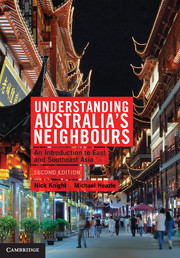Book contents
- Frontmatter
- Contents
- List of Maps
- Acronyms and abbreviations
- Acknowledgments
- Maps
- Introduction
- 1 The idea of ‘Asia’
- 2 Tradition and modernity in East and Southeast Asia
- 3 Tradition and modernity in East and Southeast Asia
- 4 Colonialism in East and Southeast Asia
- 5 Nationalism and revolution in East and Southeast Asia
- 6 Nations and nation-building in East and Southeast Asia
- 7 International politics and East and Southeast Asia
- 8 Economic growth in East and Southeast Asia
- 9 Democracy, human rights and development
- 10 Globalisation and East and Southeast Asia
- 11 China–Japan relations and US power in the twenty-first century
- 12 Australia in Asia, ‘Asia’ in Australia
- Bibliography
- Index
- References
7 - International politics and East and Southeast Asia
The Cold War and the Sino–Soviet split
Published online by Cambridge University Press: 05 June 2012
- Frontmatter
- Contents
- List of Maps
- Acronyms and abbreviations
- Acknowledgments
- Maps
- Introduction
- 1 The idea of ‘Asia’
- 2 Tradition and modernity in East and Southeast Asia
- 3 Tradition and modernity in East and Southeast Asia
- 4 Colonialism in East and Southeast Asia
- 5 Nationalism and revolution in East and Southeast Asia
- 6 Nations and nation-building in East and Southeast Asia
- 7 International politics and East and Southeast Asia
- 8 Economic growth in East and Southeast Asia
- 9 Democracy, human rights and development
- 10 Globalisation and East and Southeast Asia
- 11 China–Japan relations and US power in the twenty-first century
- 12 Australia in Asia, ‘Asia’ in Australia
- Bibliography
- Index
- References
Summary
THE CONCEPT OF A REGION suggests that the societies incorporated within it, while undoubtedly differing in significant ways, share some fundamental characteristics that provide them a regional quality. Issues that have affected one society have likewise influenced other societies; there have been shared historical, social, and political experiences. Moreover, increasing economic integration (internal trade and investment flows, convergence of economic systems) supports the suggestion that East and Southeast Asia is a region. Regionalisation of politics, through institutions such as the Association of Southeast Asian Nations (ASEAN), is also premised on an increasing convergence of political interests between the nations of East and Southeast Asia. Finally, the case for characterising East and Southeast Asia as a region is built on its importance to Australia. From the Australian perspective, East and Southeast Asia is ‘its region’. Australia's economic, political and strategic interests are closely and increasingly linked to developments in the region, and Australia has increasingly adopted a regional foreign policy response to developments in East and Southeast Asia (see Chapters 10 and 12).
Nevertheless, the concept of ‘a region’ remains problematic, for no region can remain immune from international forces. This is particularly the case with East and Southeast Asia, which has been subject to a number of extremely powerful external influences. For example, European colonialism from the late fifteenth century, while uneven in spread and degree of control, cumulatively exerted a profound impact on the societies of East and Southeast Asia. In particular, colonialism had the effect of drawing these societies into an international trading economy increasingly dominated by the economic imperatives of industrial capitalism. There had been significant intra-regional trade in East and Southeast Asia prior to European colonialism, and some international trade. However, colonialism opened the economies of East and Southeast Asia to trade, capital movements, and technology transfer on an unprecedented scale. This brought new commodities and new forms of production, which impelled social changes that impacted on the lives and fortunes of millions of people in countless ways. Similarly, the various societies and states of the region were, through the agency of colonialism, exposed to an international political order in which the nation-state had become, by the beginning of the nineteenth century, the dominant form of political organisation.
- Type
- Chapter
- Information
- Understanding Australia's NeighboursAn Introduction to East and Southeast Asia, pp. 120 - 136Publisher: Cambridge University PressPrint publication year: 2011

